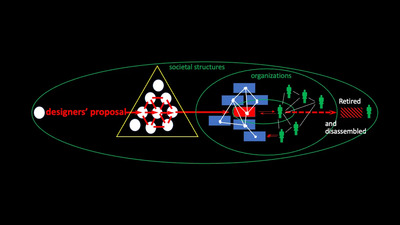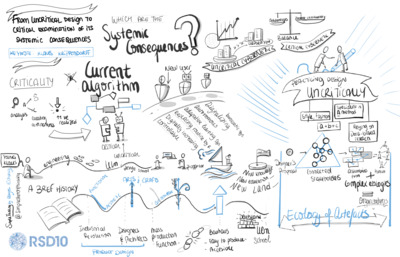From Uncritical Design to Critical Examinations of its Systemic Consequences
Krippendorff, Klaus (2021) From Uncritical Design to Critical Examinations of its Systemic Consequences. In: Proceedings of Relating Systems Thinking and Design (RSD10) 2021 Symposium, 2-6 Nov 2021, Delft, The Netherlands.
|
Video
Krippendorff_Keynote_2021.mp4 Available under License Creative Commons Attribution Non-commercial No Derivatives. Download (348MB) |
|
![Krippendorff_gigamap_2021.png [thumbnail of Krippendorff_gigamap_2021.png]](https://openresearch.ocadu.ca/3813/2.hassmallThumbnailVersion/Krippendorff_gigamap_2021.png)  Preview |
Image
Krippendorff_gigamap_2021.png Available under License Creative Commons Attribution Non-commercial No Derivatives. Download (221kB) | Preview |
![Krippendorff_Keynote-gigamap_2021.png [thumbnail of Krippendorff_Keynote-gigamap_2021.png]](https://openresearch.ocadu.ca/3813/3.hassmallThumbnailVersion/Krippendorff_Keynote-gigamap_2021.png)  Preview |
Image
Krippendorff_Keynote-gigamap_2021.png Available under License Creative Commons Attribution Non-commercial No Derivatives. Download (1MB) | Preview |
Preview |
Text
Krippendorff_Keynote_slides_2021.pdf Available under License Creative Commons Attribution Non-commercial No Derivatives. Download (428kB) | Preview |
Abstract
Gregory Bateson Professor for Cybernetics, Language, and Culture at the University of Pennsylvania’s Annenberg School for Communication
Historically, designers cherished their aesthetic competencies. However, offering them to manufacturers improved the lives of consumers only when serving industrial interests. In our information society, technologies have changed radically, but not their designers’ concerns. Human-centred design, for example, develops interfaces with complex computer networks in their user’s terms, bypassing the need to understanding these technologies.
The enthusiastic embrace of cybernetics was instrumental in automating manufacturing, commerce, communication, and everyday life. However, behind the façade of providing valuable access to users of vast databases, services, and numbers of people, contemporary design unintentionally supported the systematic algorithmisation of large segments of society. We are becoming cyborgs of ultimately oppressive socio-technological regimes.
To regain social relevance, Dr Krippendorff suggests that designers become critical of what their work supports, cognizant of and accountable for the systemic consequences of their designs and move from uncritically embracing innovations to an emancipatory perspective on the systems they enable. He encourages the community of designers to combine large systems conceptions with critical and liberating efforts.
| Item Type: | Conference/Workshop Item (Keynote) |
|---|---|
| Additional Information: | Klaus Krippendorff researches the role of language and dialogue in the social construction of reality. Klaus Krippendorff’s research focuses on the role of language and dialogue in the social construction of reality: identities, institutions, cultural artifacts, power, Otherness, and meanings; emancipatory epistemology (hermeneutics) of human communication and the design of technology; content analysis, semantics, pragmatics of social interaction, and related research methods; conversation theory, information theory, and cyberspace; and second-order cybernetics of complex communication systems and their reflexive, self-organizing, and autopoietic properties. From University of Pennsylvania | klaus.krippendorff@asc.upenn.edu |
| Divisions: | Faculty of Design |
| Date Deposited: | 19 May 2022 18:59 |
| Last Modified: | 19 May 2022 19:00 |
| URI: | https://openresearch.ocadu.ca/id/eprint/3813 |
Actions (login required)
 |
Edit View |

 Tools
Tools Tools
Tools